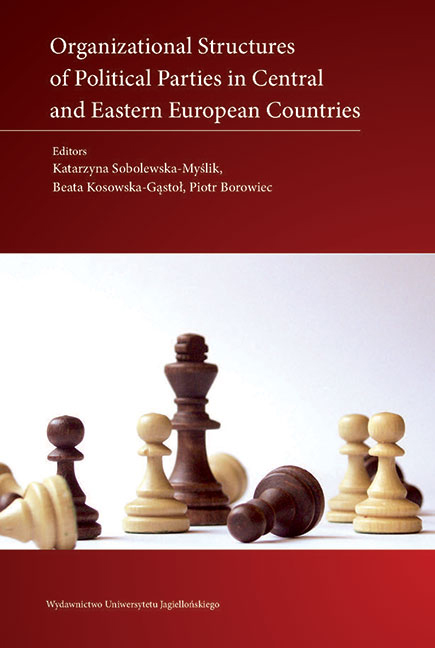Book contents
- Frontmatter
- Contents
- Preface
- Developing Party Structures in Central and Eastern Europe
- Albania: Organizations of Political Parties in Albania
- Belarus: Belarusian Political Parties: Organizational Structures and Practices
- Bosnia and Herzegovina: Organizational Structures of Political Parties in CEE Countries: A Case Study on Bosnia and Herzegovina
- Bulgaria: Organizational Structure and Trends in Bulgarian Party Politics
- Croatia: Organizational Structures of Political Parties in Croatia
- Czech Republic: Between Organizational Extremes: Czech Parties after a Political Earthquake
- Estonia: Organizational Structures of Political Parties in Estonia
- Hungary: Cut from the Same Cloth? A Comparative Analysis of Party Organizations in Hungary
- Kosovo: Structure of the Main Political Parties in Kosovo
- Latvia: Leader-Centered and Power-Hungry: Party Organizations in Latvia
- Lithuania: Organization of Political Parties: The Case of Lithuania
- Moldova: Organizational Structures of Political Parties in The Republic of Moldova
- Montenegro: Party Organization in Montenegro: Structural Resemblance Behind Political Divergence
- Poland: Structures of Polish Political Parties in the Second Decade of the 21st Century
- Romania: The Internal Organization of Romanian Political Parties
- Russia: Parties with Roots Growing Upwards: Organizational Features of Russian Political Parties
- Serbia: Organizational Structures of Political Parties in Serbia
- Slovakia: Organizational Structures of Political Parties in Slovakia: Parties not for Members
- Slovenia: Almost without Any Innovations: Organizational Structures in Slovenian Parties
- Ukraine: Shallow Party Structures in a Volatile Party System
- Comparing Organizational Structures of Political Parties in Central and Eastern European Countries
- Biographical notes about the authors
Preface
- Frontmatter
- Contents
- Preface
- Developing Party Structures in Central and Eastern Europe
- Albania: Organizations of Political Parties in Albania
- Belarus: Belarusian Political Parties: Organizational Structures and Practices
- Bosnia and Herzegovina: Organizational Structures of Political Parties in CEE Countries: A Case Study on Bosnia and Herzegovina
- Bulgaria: Organizational Structure and Trends in Bulgarian Party Politics
- Croatia: Organizational Structures of Political Parties in Croatia
- Czech Republic: Between Organizational Extremes: Czech Parties after a Political Earthquake
- Estonia: Organizational Structures of Political Parties in Estonia
- Hungary: Cut from the Same Cloth? A Comparative Analysis of Party Organizations in Hungary
- Kosovo: Structure of the Main Political Parties in Kosovo
- Latvia: Leader-Centered and Power-Hungry: Party Organizations in Latvia
- Lithuania: Organization of Political Parties: The Case of Lithuania
- Moldova: Organizational Structures of Political Parties in The Republic of Moldova
- Montenegro: Party Organization in Montenegro: Structural Resemblance Behind Political Divergence
- Poland: Structures of Polish Political Parties in the Second Decade of the 21st Century
- Romania: The Internal Organization of Romanian Political Parties
- Russia: Parties with Roots Growing Upwards: Organizational Features of Russian Political Parties
- Serbia: Organizational Structures of Political Parties in Serbia
- Slovakia: Organizational Structures of Political Parties in Slovakia: Parties not for Members
- Slovenia: Almost without Any Innovations: Organizational Structures in Slovenian Parties
- Ukraine: Shallow Party Structures in a Volatile Party System
- Comparing Organizational Structures of Political Parties in Central and Eastern European Countries
- Biographical notes about the authors
Summary
Several years ago, our team, established at both the Institute of Political Science and International Relations of the Jagiellonian University, and the Institute of Political Science of the Pedagogical University in Cracow, took on the task of analyzing the organizational structures of Polish political parties. In further pursuit of this interest, we then decided to widen the territorial range of the analysis to include political parties from Central and Eastern Europe. We believe that such research is especially important given that the organizational aspects of parties in CEE countries are currently very dynamic, due to both the young age of these parties, and the fast-changing political and social environments in which they have evolved. Our specific aim was to paint the widest possible picture of the organizational structures of the most relevant parties in Central and Eastern Europe, and to provide a basis for further comparison between them and their Western European counterparts. We focused specifically on the formal aspects of organizational structures of political parties in CEE, as reflected in their statutory rules.
In order to implement our project, we asked scholars from the region to prepare papers on the organizational structures of parliamentary parties in their respective countries, based on the formal statutes of those parties, as well as on the laws that govern their operation. The choice of countries included in the project was based on two inclusive criteria: geographic location, i.e. the countries of Central and Eastern Europe; and political history, i.e. post-communist countries, regardless whether or not they are democratic. These are: Albania; Belarus; Bosnia and Herzegovina; Bulgaria; Croatia; Czech Republic; Estonia; Hungary; Kosovo; Latvia; Lithuania; Moldova; Montenegro; Poland; Romania; Russia; Serbia; Slovakia; Slovenia; and Ukraine. The authors from these countries agreed to take part in the project, and the results of their work are presented in 20 chapters of this book. The introductory chapter contains a detailed outline of the project, and the final chapter summarizes the most important research findings. We thus submit to readers this 22-chapter book concerning the organizational structures of political parties in post-communist countries from Central and Eastern Europe.
- Type
- Chapter
- Information
- Organizational Structures of Political Parties in Central and Eastern European Countries , pp. 9 - 10Publisher: Jagiellonian University PressPrint publication year: 2017



